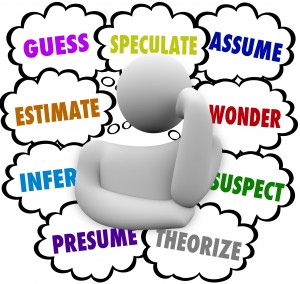Have you ever found yourself completely ticked off when another driver does something like pull in front of you only to find yourself doing the same thing that you condemned them for days later? I’d bet money, however, that when you’re driving the offending vehicle, you do not berate yourself the way that you berate your fellow drivers for the same offense. As a matter of fact, I’m pretty sure that you probably conclude that you have the most valid reasons in the world for doing whatever it is that you did. Right?
There’s an exercise that I use called “The Stories You Tell” and it highlights how we are often very quick to judge and condemn others when they do certain things but crown ourselves with a halo when we express the very same behavior.
Consider the following examples:
#1: Someone else falls short on an expectation and it’s not the first time. You say, “They are so irresponsible and unreliable.” You fall short on an expectation and it’s not the first time. You say, “My other projects were simply more important, it couldn’t be avoided.”
#2: Someone else goes off in a meeting. You say, “They have such a bad temper!” You go off in a meeting. You say, “They have been totally overworking me. That’s why I’m a bit on edge. Besides I had to explain that three times!”
#3: Someone else is glued to their cell phone during your presentation. You say, “They are so rude and unprofessional.” You’re glued to your cell phone during someone else’s presentation. You say, “My team members really need me right now. I’ve got to respond to their texts.”
See where we’re going here? We are much more willing to extend compassion and understanding to ourselves than we are to others.
Are these examples not really resonating with you?
 Well, consider this. Perhaps you do hold yourself to the same high standards that you expect from others. But I’m sure that this way of pouring on assumptions and conclusions about other people’s behaviors may creep up for you in other ways. We are all remarkably gifted at crafting stories about others based on our own interpretations and beliefs.
Well, consider this. Perhaps you do hold yourself to the same high standards that you expect from others. But I’m sure that this way of pouring on assumptions and conclusions about other people’s behaviors may creep up for you in other ways. We are all remarkably gifted at crafting stories about others based on our own interpretations and beliefs.
Chris Argyris calls it climbing the ladder of inference. It’s a very common way of starting with the facts of a particular situation, choosing which parts we want to selectively focus on, adding our own assumptions and beliefs and then allowing that to influence our actions and behaviors towards the other person. They then, of course, take our actions and behaviors, climb their own ladders and their actions follows suit.
An example:
Your boss asks you to rewrite a report a second time. You see this as one more piece of evidence that your boss is a hard to please jerk who lives to make other’s lives difficult. You conclude that you are unable to please him and that what he really wants is to see you gone anyway. Your thoughts about the situation then influence your beliefs and your actions and effects your interactions with your boss. He picks up on it, writes his own compelling version of the story and what unfolds is a self-fulfilling prophecy that supports the beliefs that you set out from the beginning to validate.
Our Expectations Don’t Usually Disappoint Us
When we fashion our thoughts about situations in this way, we train our minds to seek and find supporting evidence (which it will always happily do) and our perceptions are repeatedly reaffirmed.
In order to break this cycle, you’ll have to learn to step off ladders and outside of stories and offer up the same level of compassion and understanding that you would extend to yourself.
One great way to do this is by pausing to remember that, whatever the behavior, chances are, the person who is offending you is most likely trying to find their way just like you.
Developing a New Approach
Last week, someone actually shared something called the “Just Like Me” mantra with me and I thought that there was a lot of power in it. As I researched its roots, I found a variety of versions but they all suggest that you incorporate the “Just Like Me” phraseology whenever you’re in a quandary with someone, whether it’s the person who cuts you off while you’re driving or your co-worker who’s driving you nuts.
Simply recite . . .
Just like me, they sometimes get things really screwed up.
Just like me, their fear causes them to sometimes behave in strange ways.
Just like me, they have pain and struggle.
Just like me, they are trying to find happiness.
Just like me, they are trying to make this thing called “career” work in the best way possible.
So, the next time you’re annoyed with someone on the job, do whatever it takes to give them a compassionate pass. And nope, this does not mean that you do not address behaviors when and if necessary, but it does mean that you remove the sting of condemnation and judgment that’s usually in the mix. If you do, you’ll find that your newfound sense of compassion will go a long way in creating relationships that feel healthy and nourishing.
Want to up your game even more?
Tip: In the same way that we typically get what we expect when we focus on negative behaviors, the same holds true when we focus on positive ones instead. So, in addition to bestowing compassion to those with whom you work, begin to pay close attention to their best qualities. Make it your personal mission to consistently seek and find their brilliance and over time, that is absolutely what you will begin to experience.
“When you show deep empathy toward others, their defensive energy goes down, and positive energy replaces it. That’s when you can get more creative in solving problems. “– Stephen Covey
Monica Moody
Monica Moody



